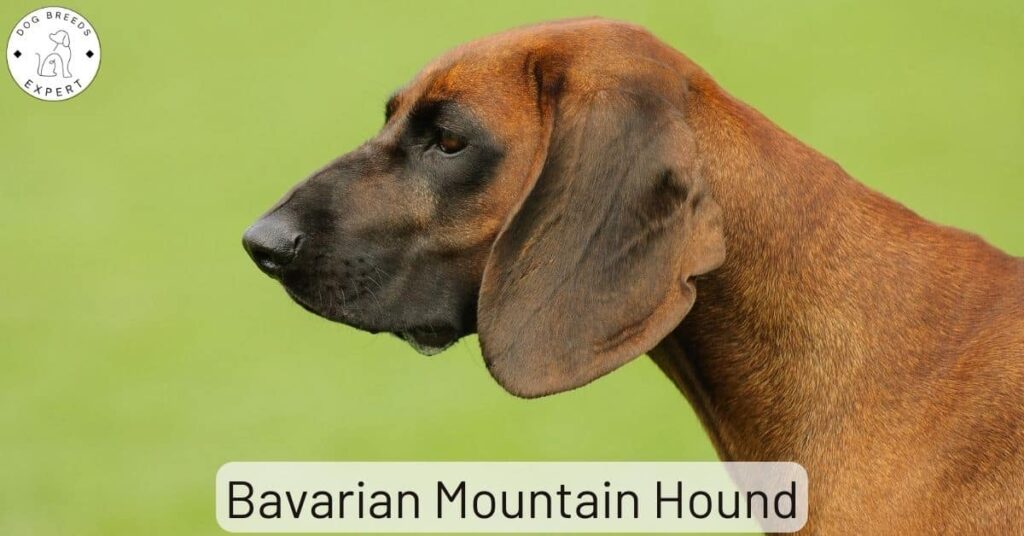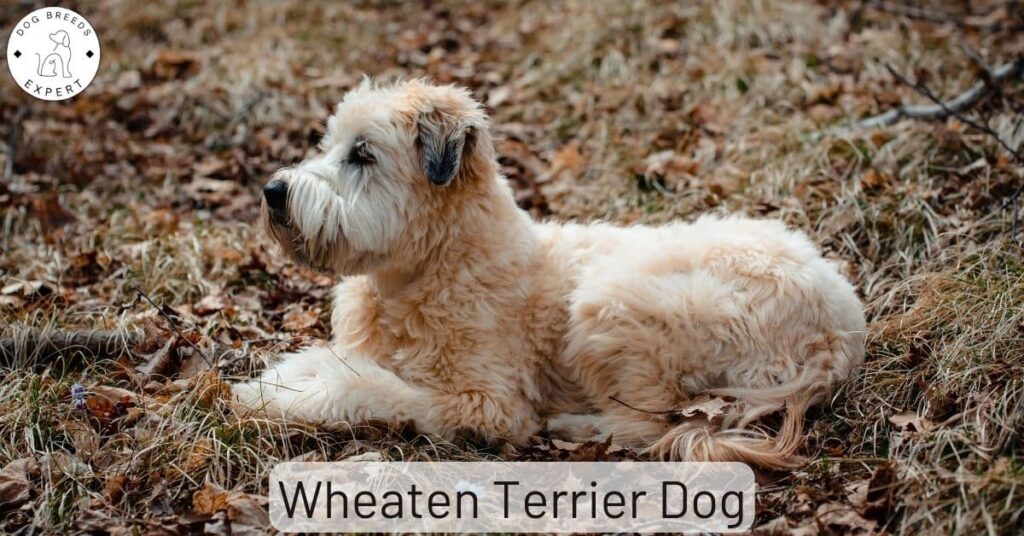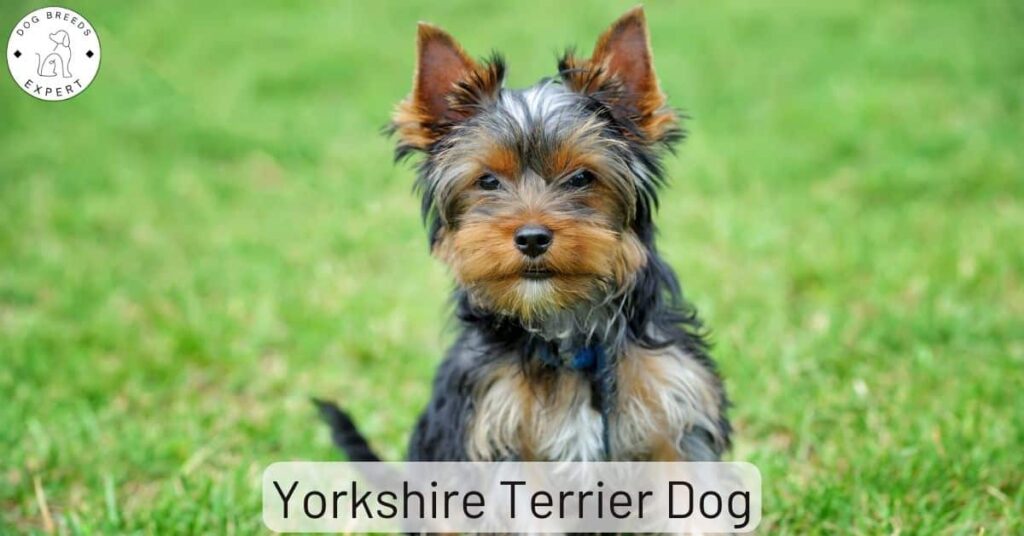A calm, confident and agile dog breed with an amazing scenting ability.
The Bavarian Mountain Hound is a scent hound with an outstanding tracking performance – they can track a specific injured animal while ignoring scents from other animals of the same type. They have a very distinctive appearance, with a black head and long ears, and a lighter-colored fawn or chestnut body. A medium-size dog, they form very strong bonds with their owner, and prefer to be with their human family rather than live in a kennel.
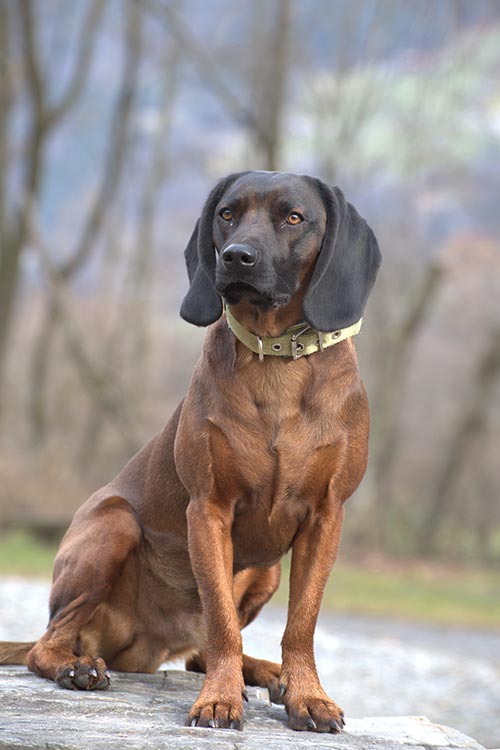
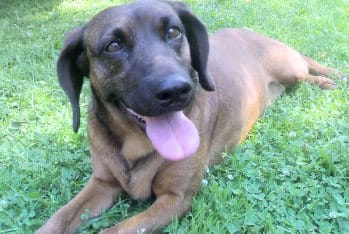
Bavarian Mountain Hound – Temperament
This a breed cut out for life in the woods and mountains. They are extremely energetic, and need a lot of exercise. Most Bavarian Mountain hounds are owned by foresters and game keepers. These dogs are not suited to apartment life, even if you can take them out to the park several times a day.
The Bavarian really needs to be in a working situation to be happy. Otherwise they quickly become bored, and will try to follow any scent that interests them, even climbing fences and digging holes to escape confinement. They need a large, well-fenced back yard to run around in, as well as getting out into the countryside every day.
Because this breed tends to form a very close attachment to one particular person, they can suffer from separation anxiety if left alone for long, and they also tend to be shy of strangers.
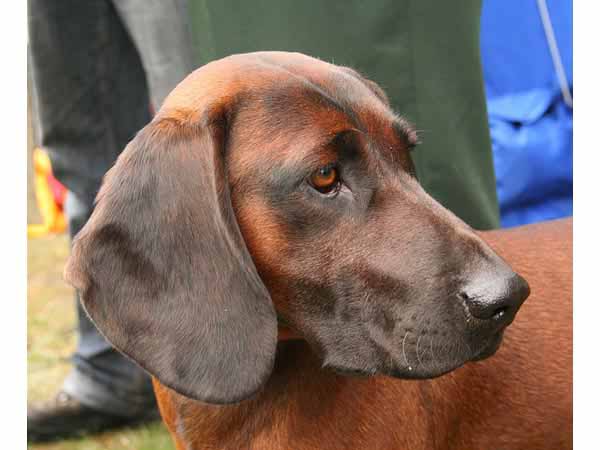
Bavarian Mountain Hound Breed History
In the late 1700s and early 1800s, the main dog used in hunting and tracking in Germany was the Hanoverian Scenthound. This was a big dog, and was a favorite in the lowlands areas of the country.
However, in higher, more mountainous areas such as southern Bavaria, the Hanovarian was too big, and hunters needed a more agile dog. After the development of reliable hunting guns, they also needed a dog capable of tracking injured or wounded animals that had been shot.
To fill this need, Baron Karg-Bebenburg of Reichenhall in Bavaria crossed a Hanoverian Scenthound with the smaller Mountain Scenthound, to produce what we would recognize as the Bavarian Mountain Hound. This new breed excelled in tracking wounded game in dense, hilly woodlands found in the forests of Bavaria.
The first club for this breed was established in Munich in 191 2.Although this dog is relatively rare, they are very popular with professional hunters, foresters and game wardens. The AKC recognized the Bavarian under its Foundation Stock Service section in October 2016.
Vital Statistics;
Height; 17 inches to 20 inches
Weight; 37 lbs to 66 lbs
Life Span; 12 to 14 years
Color;
Brindle, Fawn, Red, Reddish Brown, Tan; with Black Mask and Ears.
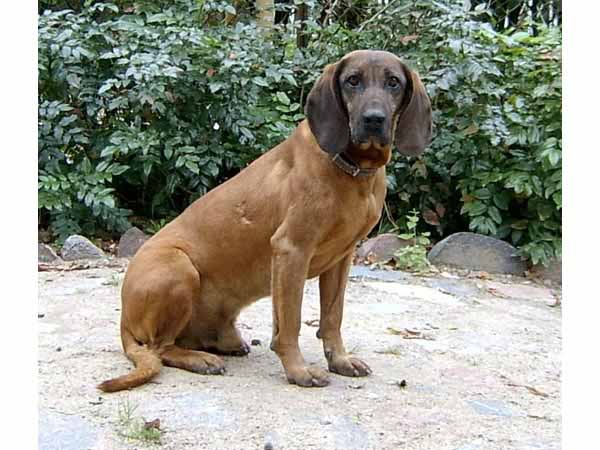
Ease of Training
This is an intelligent breed, keen to please its owner, and they are not difficult to train. They must be socialized early to introduce them to new sights, smells and strange people.
They have a strong innate desire to follow a scent,and this can distract them during formal training later on. This can be addressed by taking the dog to puppy training classes, to introduce them to the idea of training. This will help them to maintain concentration during training later on.
As a young dog, training sessions should be kept short, maybe even as short as 5 to 10 minutes at first. This keeps the session fun and interesting for the dog, and reduces the chances of distractions from interesting scents.
Grooming
The Bavarian has a short, dense coat that appears matt rather than glossy. They need regular brushing, at least once a week, to keep their coat clean. They need a bath about once a month – especially if they happen to go through some mud!
They shed regularly, more than lost breeds. This can be kept under control by brushing the coat more often, perhaps every 2 days, using a steel comb to remove the loose hairs.
The ears should be checked each week, looking out for any foreign objects, or signs of infection such as redness, swelling or a bad smell. The teeth should be brushed each day, with a dog toothpaste, not a human toothpaste.
And the fast-growing claws should be checked weekly and trimmed if needed, to prevent cracking ans splitting.
Protection
As a scent hound, The Bavarian Mountain Hound has an excellent sense of smell, even for a dog. However, it doesn’t have a particularly good sense of hearing, and may not be the most alert dog when it comes to unwanted visitors.
However, the Bavarian is usually suspicious of strangers, and will bark to alert you about anything strange going on nearby, once the dog wakes up. As a watchdog, they are not the best choice.
As a guard dog, they are not much better. This is not a big dog, and is unlikely to deter an intruder, despite all the barking. But they are agile, strong, and very brave, and may well have a go at someone trying to get into the house.
But if you are looking for protection, I suggest you look for another breed. The Bavarian Mountain Hound is not a good choice.
Health Issues
This is a very healthy breed, with few issues. However, like all dogs there are a few things to be aware of;
- Hip dysplasia
- Elbow dysplasia
- Epilepsy
Famous Bavarian Mountain Hounds
I couldn’t find any dogs that are famous in their own right – if you know of one, please let me know, using the Contact Me link. Thank you!

